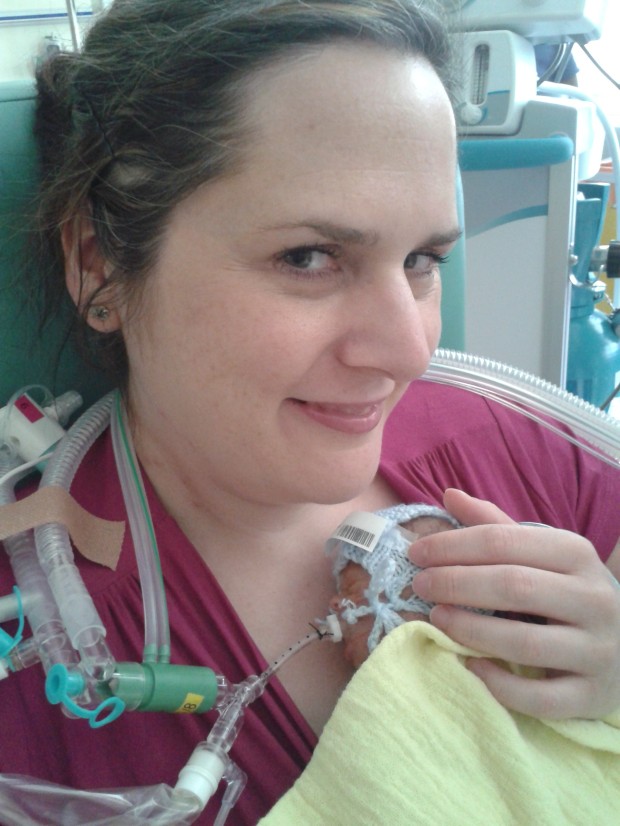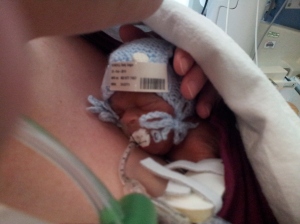Many of you will know the background to my and Hugo’s story. Hugo was born by emergency Caesarean section on February 20, 2014. The circumstances of his birth were hugely traumatic because it was literally a life-and-death situation.
The legacy of the trauma of Hugo’s birth has affected me ever since. Flashbacks, a feeling of disconnection, like I am telling a story about something that happened to another woman, not me.
For a long time I thought I was going completely forgotten. Then I was fortunate to find a wonderful community of peer supporters on Twitter, including lovely Laura. These women have had different experiences of pregnancy and birth, but shared very similar difficulties afterwards. It was incredibly reassuring for me to know that I was not alone in my feelings.
In a very strange coincidence, Laura’s son Arthur was born on the same day as Hugo. Fortunately Arthur is now a lively toddler, but his mummy still battles the effects of life after birth trauma, as she describes. I will pass you to Laura to tell her story…
_____________________________________
On 20th February 2014, my son, Arthur George, was born by emergency caesarean section. That much is definitely true.
Almost everything else is up for discussion.
I remember my labour beginning on the 16th. I believe I was told much later that my son was in the occiput posterior position, at an angle so that he was jammed and could not turn.
I laboured in a great deal of pain for days on end and reached 4cm dilation. During that time, I had two shots of pethidine.
Finally, exhausted, I had the epidural, which only worked partially, and the oxytocin drip, which then had to be increased.
My notes, which I have seen only briefly, record my heart rate at 180bpm consistently.
I pushed before I reached full dilation, because I couldn’t not push, then was given the go ahead to push and pushed for another four hours. Then there was a failed forceps delivery, during which I tore badly. Then the spinal block and caesarean, during which the incision tore open and I haemorrhaged, losing about a third of my blood. The transfusion I was promised never materialised. I went home five days later but was readmitted about a week after that with an infection.
To me, it is a familiar story, but it feels like it happened to somebody else.
Life now is certainly different. I am mummy to a lively little boy and I juggle the mundane – the nappies, the Weetabix dried to cement on my kitchen floor – and the profound – that love – much like other mummies up and down the country. It is relentless and I am tired, much like other mummies.
Unlike other mummies, I carry a deep grief. I grieve for the months that I was on autopilot, consumed by my own trauma, unable to love. I see photographs of my son as a newborn and I do not recognise him. It feels as if I missed that time, as if I were somewhere else, and I can never get it back.
It is mingled with the grief of yearning for another baby and knowing that it would not be the right choice for our family. In my mind, Arthur has a little sister. I see her so clearly. I know her name. I even talk to her sometimes. And sometimes I like to pretend that she will one day be in my belly, then in my arms.
I know pain – physical pain – as a companion in a way that I could not have understood before. Pain was always a temporary inconvenience. Now it is normal, and it is likely to be normal for the rest of my life, so I have learned how to work with it. I can no longer go from lying to sitting in one movement. I roll on to my side to get up in the morning. There are some chairs that I cannot get out of gracefully. One adapts. None of these things are world-changers, and actually I am astonished at my body’s ability to piece itself back together.
My mental health took a harder hit, I think, though I was nobody’s poster girl for mental health to begin with. This was, in a way, a blessing: when you are used to carrying a heavy load, a few extra pounds are perhaps easier than if you had never lifted anything before.
Still, I know the hypervigilance makes me a nightmare to live with: every moment is a crisis, an emergency, whether it’s something minor or something imaginary or even just a vague, gnawing unease. It is exhausting for me to be terrified so much of the time and it makes me irritable and stressful to be around.
Then there are the flashbacks. They come without warning and you cannot prepare for them. Imagine having a time machine but the machine is control. It can transport you back whenever, wherever.
I appreciate that this sounds odd; I will give an example. One evening, a few days ago, I was in a rocking chair in my son’s bedroom, with my toddler dozing happily, sprawled across my lap. My body noticed before I did that I was thirsty. (Thirst is a huge trigger for me now, and it’s difficult in this hot weather.) I was tired, and I lay back for a moment.
Suddenly I am so, so thirsty. The thirst is pain. I am on my back, unable to move. I have forgotten that I am having a baby. I have forgotten even who I am. All I know is the moment I am in, no context, no meaning. And the thirst. I am trying to speak, to ask for water, but there is no saliva in my mouth. Whenever I see a face, I try to plead for water with my eyes, but they don’t hear me. Then I see a face that I recognise – my husband – and he is holding a white plastic hospital cup of water. In that moment, he is Jesus Christ, Buddha and all four of the bloody Beatles rolled into one. He holds the cup to my lips – and it spills, soaking into my hospital gown. It is too awful. He is back, with a brightly-coloured plastic straw in a new cup of water. I manage the smallest sip before the next contraction consumes me and everything rolls away.
And then I am back and it is sixteen months later and the baby is here, grown tall and fair and fast asleep on me. I am in a warm, dimly lit room – his bedroom. I tell myself things – the date, my age – to remind me of the present. The past is gone. I am shaking a little, but it is time to put my little boy down in his cot, to go downstairs and tidy his toys, to eat dinner and live the rest of this day.
That’s all any of us can do, in the end. I call it ‘the assault of memory’, the way I relive parts of the labour, birth and postnatal period over and over. But I know that I am fortunate to be alive. I am so fortunate to have Arthur, who is everything and more. I hope that I can forge meaning from my birth experience and one day help others.
___________________________________________
If you are interested in maternity services, you may be interested in joining the Maternity Experience community.
Got a Life After…story to share? Get in touch – headspace-perspective@outlook.com

























